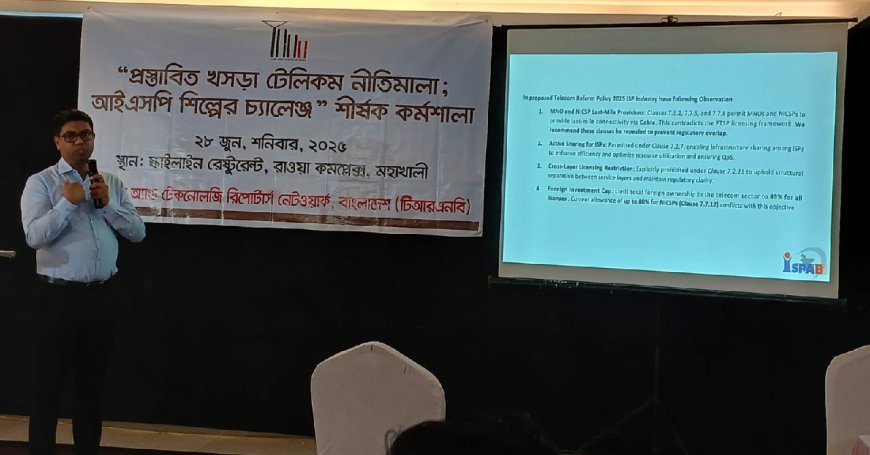Starlink Sparks Security Scare: ISPs Warn Against Policy Gaps and Capital Flight


The introduction of foreign satellite-based internet services like Starlink may create a new dimension in geopolitical conflicts, as evidenced by the ongoing war between Russia and Ukraine. Against this backdrop, internet service providers (ISPs) in Bangladesh have raised serious concerns over what they describe as a “grey policy framework” allowing Starlink to operate without clear regulatory safeguards. They warn that such unchecked access poses a threat to national security and facilitates the outflow of large sums of money abroad.
At a workshop titled “Proposed Draft Telecom Policy: Challenges in the ISP Industry”, organized by the Telecom and Technology Reporters Network Bangladesh (TRNB) at RAOWA Complex in Mohakhali on Saturday, June 28, lifetime ISPAB member Mobarak Hossain presented detailed data and analysis. He revealed that allowing the foreign service provider to operate without a ground station or Data Bandwidth Interface (DBI), and by procuring bandwidth from local ISPs, has effectively paved the way for capital flight amounting to BDT 1.7 billion upfront and BDT 540 million annually.
“In contrast to the 139 documents required for local ISPs to obtain a license and operate, a foreign company has been allowed to run its business with only a couple of papers,” Mobarak Hossain noted. “One Starlink connection, extended via cable to multiple locations, is creating opportunities for illegal ‘lady internet’ businesses and severely compromising national security. The rise of online gambling through this network is alarming, with such sites now fully accessible within Bangladesh.”
He further stated that in areas like Dhanmondi, a noticeable number of users are abandoning local ISP services in favor of Starlink, a trend that may destabilize the domestic internet market.
During the workshop, ISPAB also submitted a list of seven demands to the government, advocating for the protection of 100% locally-owned companies. The demands include establishing floor and ceiling pricing, setting the minimum package price at BDT 800 for 50 Mbps, introducing active infrastructure sharing to enhance service quality and affordability, allowing last-mile connectivity to remain under ISP control, reducing MTTN service charges to a single-digit rate, removing obligations related to the Social Obligation Fund (SOF) and revenue sharing, and ensuring protection for local entrepreneurs.
ISPs emphasized that without clear and fair regulatory guidelines, the telecom policy risks favoring foreign companies while threatening national interest, security, and the sustainability of local service providers.
এ. এইচ. এম. বজলুর রহমান ৩০ আগষ্ট, ২০২৫
শেখ শাহরুখ ফারহান ২৩ আগষ্ট, ২০২৫
আরিফ মঈনুদ্দীন ১৮ আগষ্ট, ২০২৫
আন্তর্জাতিক ডেস্ক ১০ সেপ্টেম্বর, ২০২৫
আন্তর্জাতিক ডেস্ক ১০ সেপ্টেম্বর, ২০২৫
আন্তর্জাতিক ডেস্ক ১০ সেপ্টেম্বর, ২০২৫
আন্তর্জাতিক ডেস্ক ১০ সেপ্টেম্বর, ২০২৫
আন্তর্জাতিক ডেস্ক ৯ সেপ্টেম্বর, ২০২৫
Total Vote: 46
যৌক্তিক
Total Vote: 52
একমত




